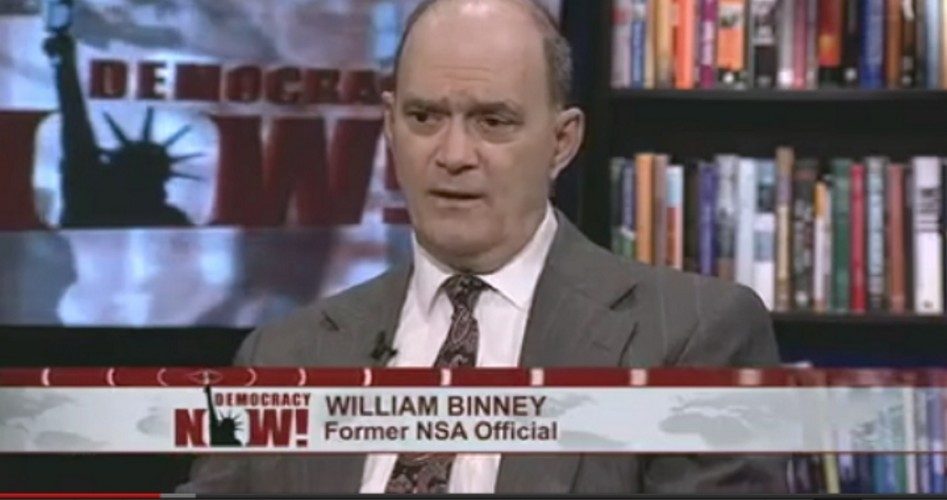
A former employee of the National Security Agency (NSA) has released information revealing that the U.S. government has been extracting vast amounts of personal data from its citizens. While working at the agency, NSA whistleblower William Binney managed the development of a covert software program called ThinThread, engineered to address “national security” concerns following the 9/11 terrorist attacks.
The narrative originated in the late 1990s when Binney, a technical director for the agency, helped develop the software to correlate data from emails, phone calls, Internet searches, and credit card activity and store it in a database to be analyzed. The system was idled by 2000, but then re-launched within weeks of the 2001 terrorist attack on the World Trade Center in New York, armed with a $3-million budget to develop new ways to monitor communications of U.S. citizens.
Binney claimed that all safeguards originally planted in the ThinThread software were destroyed, arming NSA officials with more power and resources to spy on U.S. citizens. “I knew the dangers so I built in protections,” he asserted. “And you could still find the bad guys with the protections in it. But that wasn’t what they wanted so they took those things out.”
Due to this explicit violation of constitutional rights, Binney felt the need to apologize to the American people, as his software equipped the federal government with a despotic technological tool which has spawned a civil liberties nightmare. Consequently, the NSA whistleblower has become a political liability for the U.S. government, even prompting an armed raid by the FBI on his home.
During a hacking conference this summer in Las Vegas, NSA Director General Keith Alexander denied allegations that the agency was keeping files on U.S. citizens. “Anyone who would tell you that we’re keeping files or dossiers on the American people knows that’s not true,” Alexander told the gathering of technology and security analysts. However, Binney himself attended the conference and publicly censured Alexander for playing a “word game.” “Once the software takes in data, it will build profiles on everyone in that data,” he affirmed to a convention panel.
A broad array of evidence suggests that Alexander’s defense is severely flawed. The New York Times broke a story in 2005, years after Binney had left the agency, uncovering that the NSA was engaging in a massive warrantless electronic surveillance program. The debacle paved the way to a number of amendments to the Foreign Intelligence Surveillance Act in 2008 which, according to many computer and security experts, simply provided legal safeguards to the NSA’s data-mining efforts.
This unconstitutional big-government scheme has continued under the Obama administration, spurring an uncompromising assault against national security whistleblowers, particularly against those who have leaked sensitive, and largely oppressive, NSA secrets.
After subtly protesting behind the scenes, FBI agents raided Binney’s home, aiming guns at him while he was in his shower. “Here’s a guy coming into my shower and pointing a gun at me,” Binney attested. “I’d been cooperating with these people. Why are they doing this?”
Over the past several months, Binney has been deploying a slew of efforts against the government’s unconstitutional practices, illustrating what he affirms is an intensive effort under the Obama White House to record and monitor mass amounts of data across the country, including everything from e-mails to Internet searches to Facebook posts and Twitter accounts.
According to Binney, the NSA has constructed a massive data center in Bluffdale, Utah, to administer its highly confidential program, called Stellar Wind. The building is expected to cost around $2 billion and should be in operation sometime before 2013.
“What’s happening is a violation of the constitutional rights of everybody in the country,” Binney told the Guardian. “That’s pretty straightforward. I could not be associated with it.”
President George W. Bush signed the Patriot Act in October 2001, instilling a grave civil liberties mentality that only intensified throughout his presidency. Bush and his Republican allies in Congress launched an unprecedented assault on citizen privacy, under a program sold to the public in the guise of eliminating terrorist-related threats. “The terrorists win, OK?” Binney says. “We’ve lost because we have destroyed our society just to combat them and there was really no reason to do that.”
“People should feel the ability to go out there and and do anything that they want to without being looked at all the time. Monitored. Watched,” he added.
President Obama has continued this big-government mentality by signing a four-year extension of three critical provisions in the Patriot Act, including roving wiretaps, searches of business records, and continued surveillance of those suspected of terrorist-related efforts not linked to any defined terrorist group.
Beyond renewing the Patriot Act, Obama has accelerated powers for the government to detain American citizens for so-called national security purposes, as well as deploying the Espionage Act more times than all other U.S. presidents combined. “They are still continuing the same programs — actually, Obama is doing more in some areas,” Binney said.
Meanwhile, William Binney, along with a host of other NSA whistleblowers, has risked everything — his freedom, relationships, and overall livelihood — to warn Americans about the unyielding dangers of NSA domestic surveillance, a despotic and unconstitutional menace that stands diametrically opposed to this nation’s founding principles.
Photo: William Binney during an interview with Democracy Now: YouTube video



